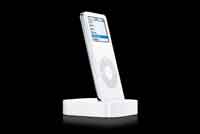 Cool, I want one!
Cool, I want one!
Apple has unveiled a new iPod. Why is this news? Because the new device is miniscule and uses flash memory as opposed to a hard drive. This confirms the rumours that Apple were buying 40% of Samsung’s flash memory.
I think that Apple has unveiled a real killer here: It has a decent capacity, is small, cute and features a colour screen. And of course, Christmas is coming up (Shouts “Dad!”).
 Ooh, Shiny, new and it rolls up!
Ooh, Shiny, new and it rolls up!
Yes, Ladies and Gentlemen, we are still in 2005 and not 2020. Even so, Phillips has managed to come up with a prototype roll-up screen. What’s special about this screen is, surprise surprise, that it is possible to roll it up as you would a sheet of paper.
At the moment, the model they have is only a prototype, and can only display four shades of grey, but when it gets better to support more colours, I’m sure it will be an instant hit with makers of Mobile Phones and other applications where a large display and a small size is an advantage.
I personally thought the fact someone had finally developed something like this was pretty neat, very futuristic, and a useful invention. I, for instance, would love to have a small phone simply because it’s, well, small. I can’t currently get one however, because the ones that are the size I would like have tiny displays and no features. Hopefully this will now change.
 Allah says no
Allah says no
Meanwhile, there’s a new virus out (Windows only, sorry Mac and Linux users) that attempts to block people from surfing pornography Websites. If the virus finds specific sexually-orientated words in a URL, it will minimize the browser window and display a passage from the Koran.
Don’t people realise that you can’t force religion on people? When will people realise that religion is something that comes naturally? People who don’t grasp this concept make me angry, although I can see there is a vaguely humorous element to this virus too.
At least the virus doesn’t damage any of your files!
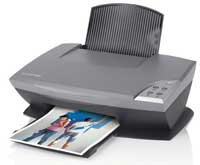 “Drop the ink cartridge and put your hands on your head!”
“Drop the ink cartridge and put your hands on your head!”
We’re told that Lexmark are attempting to outlaw refilling their cartridges. Apparently, as the ink cartridges are patented as one use only, Lexmark think they can enforce this on anyone running a business refilling ink tanks. Luckily, patents don’t apply to non-for profit activities yet, so it’s still safe to refill a cartridge yourself.
I think there should be bans about companies applying terms of use on something that a consumer has actually bought. If it belongs to you, you should be able to do as you wish with it!
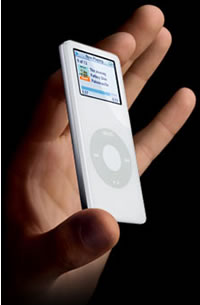 iTunes 5.0
iTunes 5.0 Motorola ROKR
Motorola ROKR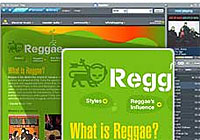 For the first time since its UK launch May 2004, the online music store Napster has dished the dirt on its usage and membership figures for the UK.
For the first time since its UK launch May 2004, the online music store Napster has dished the dirt on its usage and membership figures for the UK.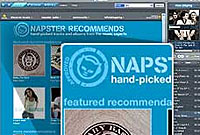 This represents an amazing turnaround for Napster who famously started life as the brainchild of an 18-year-old college dropout named Shawn Fanning in 1999.
This represents an amazing turnaround for Napster who famously started life as the brainchild of an 18-year-old college dropout named Shawn Fanning in 1999.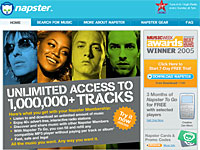 Napster folded in September 2002, but the brand was revived as a legal P2P service by the owners of the Napster name Roxio in 2003, quickly growing to become a major competitor for market leader iTunes.
Napster folded in September 2002, but the brand was revived as a legal P2P service by the owners of the Napster name Roxio in 2003, quickly growing to become a major competitor for market leader iTunes.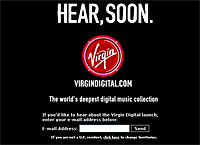 Sir Richard Branson will be slamming the virtual champagne against the good ship Virgin Digital UK as another digital music service slides down the slipway on September 2nd.
Sir Richard Branson will be slamming the virtual champagne against the good ship Virgin Digital UK as another digital music service slides down the slipway on September 2nd.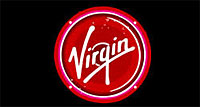 Virgin Digital UK is set to serve up a mix of digital music store, music club subscription service, streaming radio, powerful digital music and portable device management tools, along with a collection of music-discovery gizmos.
Virgin Digital UK is set to serve up a mix of digital music store, music club subscription service, streaming radio, powerful digital music and portable device management tools, along with a collection of music-discovery gizmos. Warner Music Group has announced a new digital music distribution mechanism based on downloads rather than physical media like CDs.
Warner Music Group has announced a new digital music distribution mechanism based on downloads rather than physical media like CDs.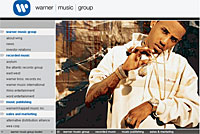 With far lower production costs, Bronfman claimed that the e-label will give recording artists a “supportive, lower-risk environment” (I think this means “less cash from the record company”) without as much pressure for huge commercial hits – something that could benefit artists with a more “selective audience”.
With far lower production costs, Bronfman claimed that the e-label will give recording artists a “supportive, lower-risk environment” (I think this means “less cash from the record company”) without as much pressure for huge commercial hits – something that could benefit artists with a more “selective audience”.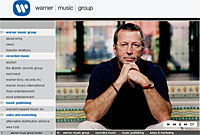 Bronfman called on the technology industry to work on digital rights management (DRM) standards, arguing that compulsory licensing – with support from P-to-P vendors – would set a price for downloaded music while forcing music companies to make their products available online to P-to-P users.
Bronfman called on the technology industry to work on digital rights management (DRM) standards, arguing that compulsory licensing – with support from P-to-P vendors – would set a price for downloaded music while forcing music companies to make their products available online to P-to-P users. Thanks to Tim for the update on the details of this story
Thanks to Tim for the update on the details of this story While not the first synth, it became popular as it grabbed musicians attention in its flexibility, enabling them to express themselves.
While not the first synth, it became popular as it grabbed musicians attention in its flexibility, enabling them to express themselves.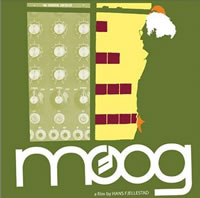 I was lucky enough to see the film Moog, by Hans Fjellestad a couple of week ago and if you haven’t seen it I’d highly recommend that you do. It was clear that Moog was a man who was not only admired by the people around him, but genuinely liked.
I was lucky enough to see the film Moog, by Hans Fjellestad a couple of week ago and if you haven’t seen it I’d highly recommend that you do. It was clear that Moog was a man who was not only admired by the people around him, but genuinely liked.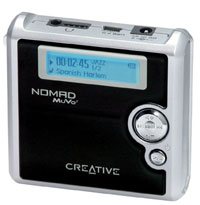
 First of all, space is cool from the perspective of a teenager, and there’s no worrying about how much tax payers money is put into these kind of projects. With this in mind, I was delighted to hear that the Shuttle
First of all, space is cool from the perspective of a teenager, and there’s no worrying about how much tax payers money is put into these kind of projects. With this in mind, I was delighted to hear that the Shuttle  It used to be that artists rebelled against the system, the government, the breadheads and The Man, but artists signed to Sony in Japan are fighting their label’s decision not to make their songs available through the iTunes Music Store.
It used to be that artists rebelled against the system, the government, the breadheads and The Man, but artists signed to Sony in Japan are fighting their label’s decision not to make their songs available through the iTunes Music Store. Talks between the two electronic giants Sony and Apple are believed to be continuing to resolve the problem.
Talks between the two electronic giants Sony and Apple are believed to be continuing to resolve the problem. Sony BMG’s global digital business president Thomas Hesse was full of optimism about the emerging opportunities brought about by digital distribution channels such as iTunes and ringtones.
Sony BMG’s global digital business president Thomas Hesse was full of optimism about the emerging opportunities brought about by digital distribution channels such as iTunes and ringtones.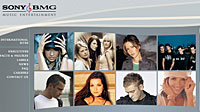 The Sony bigwig suggested that the record industry could learn from the movie studios where carefully-timed “release windows” have helped maximise commercial opportunities for new films.
The Sony bigwig suggested that the record industry could learn from the movie studios where carefully-timed “release windows” have helped maximise commercial opportunities for new films.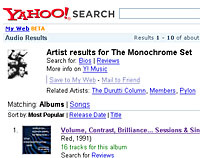 Yahoo is testing a new Audio search facility to let users find audio files on the Web.
Yahoo is testing a new Audio search facility to let users find audio files on the Web.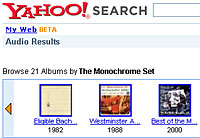 Although the service is still in beta we were impressed with its speedy and simple interface: typing in the name of one of my (sadly) obscure old punk songs immediately brought up the album details, a list of download locations and links to reviews and other released albums.
Although the service is still in beta we were impressed with its speedy and simple interface: typing in the name of one of my (sadly) obscure old punk songs immediately brought up the album details, a list of download locations and links to reviews and other released albums.